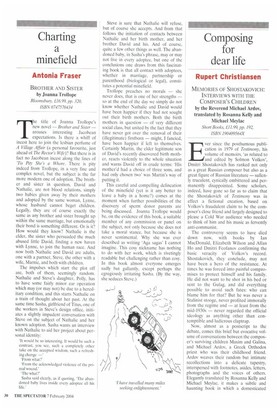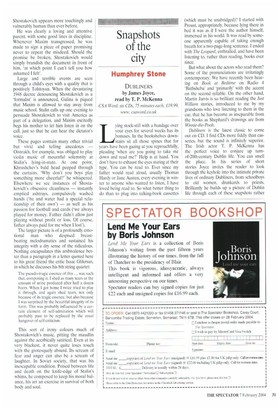Composing for dear life
Rupert Christiansen
MEMORIES OF SHOSTAKOVICH: INTERVIEWS WITH THE COMPOSER'S CHILDREN by the Reverend Michael Ardov, translated by Rosanna Kelly and Michael Meylac Short Books, £11.99, pp. 192, ISBN I90409564X
Ever since the posthumous publication in 1979 of Testimony, his volume of memoirs, 'as related to and edited by Solmon Volkov', Dmitri Shostakovich has ranked not only as a great Russian composer but also as a great figure of Russian literature — sullenly truculent, cynically embittered and permanently disappointed. Some scholars, indeed, have gone so far as to claim that the Shostakovich of Testimony was in effect a fictional creation, based on Volkov's fraudulent claim to be the composer's close friend and largely designed to please a Cold War audience who needed to think of him and his music as fervently anti-communist.
The controversy seems to have died down now, with books by Ian MacDonald, Elizabeth Wilson and Allan Ho and Dmitri Feofanov confirming the basic veracity of Volkov's record. Shostakovich, they conclude, may not have been a hero of the resistance. At times he was forced into painful compromises to protect himself and his family. He did not want to be shot in his bed or sent to the Gulag, and did everything possible to avoid such fates: who can blame him for that? But he was never a Stalinist stooge, never profited immorally from the regime and — at least from the mid-1930s — never regarded the official ideology as anything other than contemptible and ludicrous claptrap.
Now, almost as a postscript to the debate, comes this brief but evocative volume of conversations between the composer's surviving children Maxim and Galina, and Michael Ardov, a Greek Orthodox priest who was their childhood friend. Ardov weaves their random but intimate recollections into a delicate tapestry, interspersed with footnotes, asides, letters, photographs and the voices of others. Elegantly translated by Rosanna Kelly and Michael Meylac, it makes a subtle and haunting book in which a domesticated Shostakovich appears more touchingly and vulnerably human than ever before.
He was clearly a loving and attentive parent, with some good lines in discipline.
Whenever Maxim transgressed, he was made to sign a piece of paper promising never to repeat the misdeed. Should the promise be broken, Shostakovich would simply brandish the document in front of him, 'at which point I can't tell you how ashamed I felt'.
Large and terrible events are seen through a child's eyes with a quality that is positively Tolstoyan. When the devastating 1948 decree denouncing Shostakovich as a 'formalist' is announced, Galina is piqued that Maxim is allowed to stay away from music school. Stalin calls up one evening to persuade Shostakovich to visit America as part of a delegation, and Maxim excitedly begs his mother to let him listen in on the call, just so that he can hear the dictator's voice.
These pages contain many other trivial but vivid and telling anecdotes — Oistrakh, for example, was obliged to play violin music of mournful solemnity at Stalin's lying-in-state. At one point, Khrushehey's bald head peeped through the curtains. 'Why don't you boys play something more cheerful?' he whispered. Elsewhere we see instances of Shostakovich's obsessive cleanliness — instantly emptied ashtrays, compulsively washed hands (lie and water had a special relationship of their own') — as well as his passion for football and cards (we always played for money. Father didn't allow just playing without profit or loss. Of course, father always paid for me when I lost').
The larger picture is of a profoundly emotional man who despised breastbeating melodramatics and sustained his integrity with a dry sense of the ridiculous. Nothing encapsulates this ambivalence better than a paragraph in a letter quoted here to his great friend the critic Isaac Glikman, in which he discusses his 8th string quartet:
The pseudo-tragic essence of this ... was such that, composing it. I shed as many tears as the amount of urine produced after half a dozen beers. When I got home [twice tried to play it through, and again shed tears, not only because of its tragic essence, but also because I was surprised by the beautiful integrity of its form. This was probably influenced by a certain element of self-admiration which will probably pass to be replaced by the usual hangover of self-criticism.
This sort of irony colours much of Shostakovich's music, pitting the maudlin against the acerbically satirical. Even at its very blackest, it never quite loses touch with the grotesquely absurd. Its scream of fear and anger can also be a scream of laughter. In Soviet society, that was his inescapable condition. Poised between life and death on the knife-edge of Stalin's whims, he composed to keep his moral balance, his art an exercise in survival of both body and soul.



























































 Previous page
Previous page